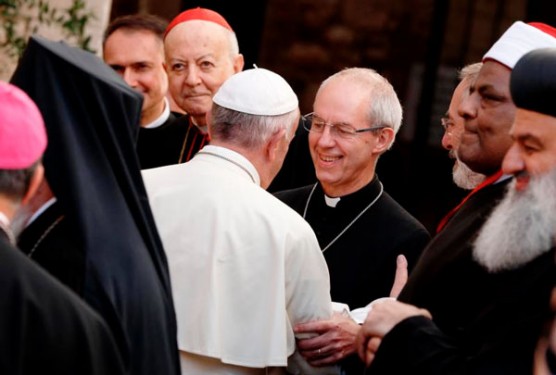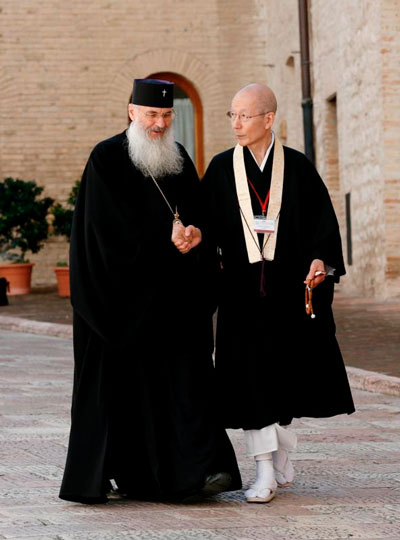
By Junno Arocho Esteves
ASSISI, Italy (CNS) — Violence in the name of God does not represent the true nature of religion and must be condemned by all faiths, Pope Francis said.
“We never tire of repeating that the name of God cannot be used to justify violence. Peace alone, and not war, is holy!” the pope said Sept. 20 at the closing ceremony of an interreligious peace gathering in Assisi.
The three-day event, organized by the Rome-based Community of Sant’Egidio, the Diocese of Assisi and Franciscan friar, had as its theme: “Thirst for Peace: Faith and Cultures in Dialogue.” This meeting of dozens of religious leaders marked the 30th anniversary of St. John Paul II’s Assisi interfaith peace gathering in 1986.
Following a prayer service with Christian leaders, including Orthodox Ecumenical Patriarch Bartholomew of Constantinople and the Anglican Archbishop Justin Welby of Canterbury, the pope joined religious leaders from around the world to appeal for peace and unity.
The religious leaders also heard the experience of a victim of war from the Syrian city of Aleppo and prayed for those who had died in conflicts around the world.
In his speech, the pope called on believers of every faith “to confront the great sickness of our time: indifference.”
“It is a virus that paralyzes, rendering us lethargic and insensitive, a disease that eats away at the very heart of religious fervor, giving rise to a new and deeply sad paganism: the paganism of indifference,” he said.
Recalling the faces of refugees he and Patriarch Bartholomew met on the Greek island of Lesbos in April, the pope called on religious believers to not remain indifferent to the suffering of others but instead to be the voice of those unheard.
Thirst for Peace
“I am thinking of the families, whose lives have been shattered; of the children who have known only violence in their lives; of the elderly, forced to leave their homeland. All of them have a great thirst for peace,” he said. “We do not want these tragedies to be forgotten.”
True peace, he said, is not a result of “negotiations, political compromises or economic bargaining, but the result of prayer.”
A peace “that is not illusory,” the pope said, must be accomplished through concrete actions of assistance to those in need and cannot be achieved with “the ‘virtual’ approach of one who judges everything and everyone using a computer keyboard, without opening his eyes to the needs of his brothers and sisters, and dirtying his hands for those in need.”
In continuing the legacy of the 1986 peace gathering in Assisi, faith leaders must join together in denouncing the use of religion to justify violence.
“Violence in all its forms does not represent the true nature of religion. It is the antithesis of religion and contributes to its destruction,” the pope said.
Pope Francis called on religious leaders to “free ourselves from the heavy burden of distrust, fundamentalism and hate” and instead be “artisans of peace” through prayer and action.
As religious leaders, he said, “we are duty bound to be strong bridges of dialogue, creative mediators of peace.”
“Let us assume this responsibility, reaffirming today our ‘yes’ to being, together, builders of the peace that God wishes for us and for which humanity thirsts,” the pope said.

Failure of Ecumenism
Speaking before Pope Francis arrived in Assisi for an interreligious peace meeting, Archbishop Welby joined other Christian leaders in exploring how love, charity and mercy help foster peace and unity among Christian denominations.
Churches that are not reconciled with one another weaken the experience of mercy that unites believers to God and with each other, the archbishop said. By not reconciling with one other, “our worship is diminished and our capacity to grow close together with God is reduced,” he explained during a discussion on ecumenism.
“The failure of ecumenism imprisons mercy and prevents its liberation and its power with one another,” he said.
Mercy is the “engine of reconciliation,” Archbishop Welby said, and it is “the source of our capacity for the evangelization of the world in which we live.”
“Mercy begins with the mercy that each of us experiences in the sacrament of reconciliation; the knowledge that we ourselves are accepted,” he said.
Suffering and martyrdom, the archbishop added, also unite Christians and are a visible sign of ecumenism for the world.
“If we do not suffer together, we do not know the meaning of the ecumenism of mercy,” he said. “When they kill us, they do not ask if we are Anglican, Presbyterian, Catholic or Orthodox; we are one in Christ for them. So why are we divided when they are not killing us?”
Echoing Jesus’ prayer “that they may be one so that the world may know that I come from the Father,” Archbishop Welby said that the evangelization of the world “depends on that ecumenism of mercy.”
While they may have theological differences, he said, Christians must learn to “disagree well” and “learn to love one another with good disagreement.”
Evangelization depends on the visible sign of love and unity. If not, churches will be unable “to carry out Jesus’ command to go out into the world,” he said.
“It depends on the world seeing visibly that we belong to one another and that we love one another,” Archbishop Welby said. “Without that, we have nothing to say to a world that is incapable of resolving its own differences.”
Related: Pope in Assisi Prays for Peace
